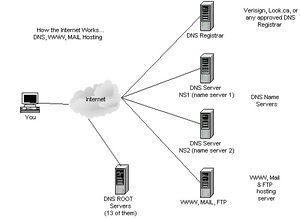Internet Or Internot?
Contents
Introduction
Authors
L07 Group 2: Internet or Internot?
- Shamus Hardie
- Elizaveta Kaplunova
- Howard Kong
- Stephen Lindstrom
Project Details
- Technology: The Internet
- Issue: Communication Through the Internet
Initial Project Statement
With the invention of the internet comes the dawn of a new era in communication. No longer are people dependent on expensive telephone calls to talk to relatives half-a-world away. No longer are individuals forced to wait for months to receive letters from friends and family who may be on the other side of the planet. With the invention of the internet, a network that connects computers all around the world, those that have access can send messages, deliver letters, and communicate with others anywhere on the globe instantaneously.
However, with the presence of the internet invading many aspects of our everyday lives, including school, work, and recreation, trends show that society has developed a dependence on the internet to fulfill its everyday needs. Often coined 'Internet Addiction', studies show that people are spending more and more time interacting with others online than face-to-face. Also, many individuals are spending long periods of time a day on the internet, which is physically unhealthy.
Through the use of secondary research, our team will address the pros and cons of communication through the internet and produce a possible solution to this issue,
Argument
Though communication through the internet has proven to be convenient, affordable, and effective, it has proven to have its pitfalls as well. Negative aspects include internet addiction, deteriorating face-to-face communication, dependency on the internet to meet our everyday needs, and overuse of the computer on a daily basis which is leading to negative health impacts. This leads us to the argument: Is internet communication beneficial to society, or is it leading to the degeneration of face-to-face communication? We will go into depth about these issues and ultimately prove that the internet is a powerful tool that should be utilized, as long as it is used in moderation.
Pros and Cons
To identify the pros and cons of internet communication, we will study the primary applications accessed by users to communicate over the medium of the internet and discuss the positive and negative aspects of each. They include online blogs and recreational sites, messenger programs, e-mail, and social networking services.
Blogs and Recreation Sites
A popular means of recreation in 2008 is the use of video blog sites such as | YouTube. These sites are used to easily post videos created by users for other users to view. Videos range from blogs to 'how-to' tutorial videos to videos created simply for amusement.
- Pros - Through the use of sites such as YouTube, users have been able to express themselves by posting videos and video blogs relating to their lifestyle. Informative videos have also allowed viewers to acquire new skills simply from watching a poster's tutorial videos. Videos posted on YouTube have also been essential in distributing media that is beneficial to users such as music videos and movie trailers. The majority of users who use video blog sites do so for pure entertainment purposes. The internet users of this generation are enthralled by the lives of others. Videos that are commonly watched include but aren't limited to listening to music, viewing video blogs, watching magic tricks, science experiments, daring feats, and seeing into the lives of others.
- Cons - Though YouTube allows users to post their opinions through videos, this also enables users to post hate videos and videos 'bashing' or insulting other users. Since the internet connects many people around the globe, it gives certain individuals a sense of security knowing they are free to offend people over the internet because they cannot be reprimanded for their actions. This leads to a degeneration of morals in society and steps must be taken to advert negative impacts on users who start to think that this is acceptable. Many users are also spending all of their time using online recreation sites and this is a physically unhealthy practice. Copyright infringement is also an issue since users are free to post copyrighted content such as movies and songs from albums that aren't available to the general public.
Messenger Programs/Chatrooms
Messenger programs such as | MSN, ICQ, and IChat are commonly used programs to send mainly instant text messages to other users. Significant technological advances have allowed for video calls to be made online, allowing users to see and speak to other users as if making a phone call with video online.
- Pros - An advantage of using messenger programs and chatrooms is that they are much more convenient than using the telephone to make calls to people that are very far away. Most messenger programs and chatrooms are free so this defeats the purpose of paying large sums of money to make long-distance calls. Chatrooms allow users to communicate with other people in the community or in other parts of the world to retrieve information.
- Cons - The biggest disadvantage of using messenger programs is that it is very impersonal and because of its convenience, more and more users are deciding to chat online rather than chatting face-to-face. This can also lead to false identity because it is impossible to see who one is actually talking to on the other side of the screen. With chatrooms, there have been many incidents of pedophiles luring unsuspecting children online using false identity and impersonation due to the ease of accessibility of online chatrooms.
E-mail is a form of sending both text-typed messages as well as files attached to them. The basic form of e-mail is a simple, short message such as, “Hi, how are you?” It could also be much longer or even shorter.
- Pros - The main point of e-mail is being able to attach other documents as well. The most common document sent is text documents. Sending documents as e-mail is more convenient than simply typing your message into an e-mail. For example, text documents can be much longer than e-mails and can also be more easily edited as well as saved and worked on later. More complicated documents can also be sent through e-mail such as slide shows, pictures and even videos. Easily the most convenient of all of e-mail’s features is that many companies offer free, e-mail accounts that can be used to send messages great distances both faster and cheaper than postal service or fax machines. Sending electronic messages with e-mail is so quick and easy that it is one of the most used systems on the internet.
- Cons - Though e-mail is indeed very convenient, the downfall is that both participants require internet in order to interact. The convenience of e-mail also makes it possible for chain letters and advertising/web spam by large corporations to be mass distributed to several e-mail users, leading to a diluted presence of useful information. One cannot send physical objects through e-mail, only electronic files on the computer. Most importantly, e-mail is not as personal as writing a letter by hand.
Social Networking Services
Social Networking Services(SNS) have become increasingly popular recently with the global success of the website Facebook. A SNS can be defined as an online community where users can interact with other users and generally have a profile where they can display personal info, blogs, and posted pictures, videos, etc.
Statistics and History - Early sites began to form around 1995, when classmates.com was created to connect former students with one another. The biggest boom in these sites were between 2002 and 2004 when Friendster, Myspace, and Bebo were formed as the top sites of the time. Nexopia was made in Canada in February 2003, and is used mostly by western Canadians(as Nexopia's headquarters are based in Edmonton, Alberta). But by far the site that is now gaining ground as a monopolistic site is the well known Facebook. With the previous leader of myspace, Facebook was gaining more popularity than any other site, and membership was rising exponentially higher than any other site in a smaller period of time. (1)
As of October, 28th, 2008, Facebook released a statement of their statistics to the press, http://www.facebook.com/press/info.php?statistics, each jot note was a point to show Facebook's dominance in the SNS market. Some of the statistics included were: (2)
- $300 Million Revenue 2008
- 1 Most Trafficked Social Site (International)
- 1 Photo Sharing Application
- 4 Most Trafficked Overall Site (International)
- 10 Billion Photos
- 35 Languages Available
- Approximately 130 Million+ Users Worldwide
Pros - Positive aspects of SNS, primariy Facebook, include allowing users to connect easily with others (and can even find old friends and see what they've been up to). Most sites are free, or at least relatively inexpensive. Users can stay up to date with what everyone else is doing (see who has a birthday coming up, if there is an event on a certain day, relationships, or even if someone has become friends with someone else) Easy to set up and then use; provide an email and a name and you are ready to go. With options and many applications, people can keep themselves entertained and amused playing games, loading photos, and letting others know what kind of music they enjoy. Some of the games available are; Tetris, Poker, Sports Betting, Puzzles, and one of the best known-Jet Man. (3)
Cons - Invasion of privacy- as everything about everyone can be posted; some people feel uncomfortable if something happens to them, yet they did not intend to have a story posted about them for everyone to see. With Phishing scams (emails/messages used to lure credit card information from people), some people can be too naive or accepting to anything they see, and therefore become more susceptible to cyber crime. People are more willing to give up their personal information on these sites than to people in real life - people post their names, addresses, ages, phone numbers, photos, email addresses, and where they go to school. What they don't realize is that anyone can see these, even with personal protection through the sites. People are easily addicted to these sites, and many companies have banned access to improve productivity. Iran and Syria have taken a step even further to prevent any access within the respective countries to prevent citizens from publicly criticizing the government (which is punishable by imprisonment). One of the biggest problems with these sites is bullying. People can be sent derogatory messages the same way they could have been humiliated in person. In one case there was a 13 year old Megan Meier who was bullied by a 'love' interest, 16 year old 'Josh Evans' who was actually portrayed by Megan's friend's mother checking to see if her own daughter was being bad-mouthed by Megan. It eventually led to the extent where the 13 year committed suicide in 2006. (4)
Conclusion
Based on the evidence above, the pros of communication using the internet centers around its convenience, affordability, effectiveness, margin of creativity, and entertainment value.
The downside of this technology is that it can lead to unethical practices due to the anonymity of the internet, a reduction in face-to-face communication, and it is very impersonal.
To mitigate these downsides, it is possible to use the internet in moderation. Rather than using messenger programs to talk to everyone, reserve it for conversations that are beyond the convenience of chatting face to face or a telephone call. Rather than relying solely on YouTube for entertainment, perhaps try to go outside on a sunny day instead. Monitor children's activities over the internet to make sure that they are not associating with individuals that may pose harm to them. Above all, do not take other users' comments too seriously.
Like all things in life, use of the internet must be taken in moderation. If this is accomplished, it is possible to use the internet for communication in a safe, convenient, and plausible environment.
References
- | http://www.punny.org/wp-content/images/200701/20070106internet_cat.jpg
- | http://nisi.ab.ca/Tech__Support/The_Internet/how_the_internet_works.jpg
- | http://www.youtube.com
- | http://blogs.lynn.edu/rollcamera/files/2008/08/youtube-logo.jpg
- | http://messenger.msn.com
- | http://www.downloadsquad.com/media/2005/12/msn_messenger_logo.jpg
- | http://www.ruf.rice.edu/~evolve/images/emailIcon.png
- [1]
- [2]
- [3]
- [4]




